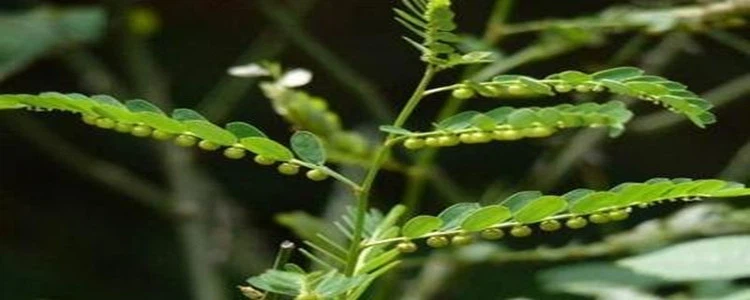Phyllanthus urinaria is a common weed found in tropical regions worldwide, including Southeast Asia, Africa, and South America. In traditional medicine, Phyllanthus Urinaria Extract has been used for its medicinal properties to treat various ailments, including urinary tract infections, kidney stones, and liver diseases. The plant contains a broad range of bioactive compounds that have shown potential therapeutic benefits in scientific studies. This article will discuss the various uses and potential health benefits of Phyllanthus urinaria.

![]()
Chemical composition of Phyllanthus Urinaria:
Phyllanthus urinaria contains a diverse range of bioactive compounds, including alkaloids, flavonoids, lignans, tannins, triterpenoids, and polyphenols. Many of these compounds have been investigated for their potential medicinal properties, such as antimicrobial, anticancer, and hepatoprotective activities.
Alkaloids: Alkaloids are naturally occurring nitrogenous compounds that commonly exhibit various bioactivities, such as antimicrobial, anticancer, and anti-inflammatory effects. Phyllanthus urinaria contains several alkaloids, including phyllanthus alkaloids, nirurin, hypophyllanthine, and phyllanthine. These alkaloids have been shown to exhibit cytotoxic effects against various cancer cell lines, including human prostate, breast, and liver cancer cells.
Flavonoids: Flavonoids are a class of polyphenolic compounds that are widely distributed in plants and are known for their antioxidant, anti-inflammatory, and anticancer properties. Phyllanthus urinaria contains various flavonoids, including quercetin, myricetin, kaempferol, and rutin. These compounds have been shown to exhibit various bioactivities, including antioxidant, anti-inflammatory, and hepatoprotective activities.
Lignans: Lignans are polyphenolic compounds that exhibit various bioactivities, including antitumor, antimicrobial, and antioxidant properties. Phyllanthus urinaria contains several lignans, including phyllanthin, hypophyllanthin, and geraniin. These compounds have been shown to exhibit significant cytotoxic effects against various cancer cell lines, including liver, prostate, and breast cancer cells.
Tannins: Tannins are a class of polyphenolic compounds that are widely distributed in plants and are known for their astringent properties. Phyllanthus urinaria contains various tannins, including ellagitannins, punicalagins, and punicalins. These compounds have been shown to exhibit antimicrobial and antioxidant activities.
Triterpenoids: Triterpenoids are a class of terpenes that are widely distributed in plants and are known for their various bioactivities, including antibacterial, antifungal, and anticancer properties. Phyllanthus urinaria contains several triterpenoids, including ursolic acid and oleanolic acid. These compounds have been shown to exhibit various bioactivities, including anticancer, anti-inflammatory, and hepatoprotective activities.
Health Benefits of Phyllanthus Urinaria Extract:
1. Urinary Tract Infections (UTIs):
Phyllanthus urinaria has long been used traditionally to treat urinary tract infections (UTIs). UTIs occur when bacteria infect the urinary tract, which includes the kidneys, bladder, ureter, and urethra. The plant contains various bioactive compounds, such as alkaloids, flavonoids, and tannins, that have been shown to exhibit antibacterial activity against UTI-causing bacteria, such as Escherichia coli.
A study published in the Journal of Medicinal Food showed that the aqueous extract of Phyllanthus urinaria inhibited the growth of E. coli and Staphylococcus aureus strains that cause UTIs. The study concluded that the plant extract could be an alternative treatment for UTIs, especially when antibiotics are not effective or are contraindicated.
2. Kidney Stones:
Kidney stones refer to hard mineral deposits formed in the kidneys or urinary tract. They can cause severe pain and discomfort when passing through the ureter. Phyllanthus urinaria has been used traditionally for its stone-breaking properties and to prevent kidney stone formation. The plant contains several bioactive compounds, such as lignans and alkaloids, that have been shown to exhibit anti-urolithiatic activity, meaning they can prevent or dissolve kidney stones.
A study published in the Journal of Ethnopharmacology showed that the ethanolic extract of Phyllanthus urinaria significantly reduced the size and number of calcium oxalate crystals in rats, which are commonly found in kidney stones. The study concluded that the plant extract could be an effective and safe natural remedy for kidney stone prevention and management.
3. Liver Health:
The liver is an essential organ responsible for several vital functions, such as detoxification, bile production, and storage of vitamins and minerals. Phyllanthus urinaria has been traditionally used to treat liver diseases, such as hepatitis and fatty liver. The plant contains various bioactive compounds, such as lignans, flavonoids, and polyphenols, that have been shown to exhibit hepatoprotective activity, meaning they can protect the liver from damage caused by toxins and oxidative stress.
A study published in the Journal of Medicinal Food showed that the aqueous extract of Phyllanthus urinaria significantly reduced liver damage in rats induced by a toxic compound called carbon tetrachloride. The study concluded that the plant extract could be a potential natural remedy for liver damage and inflammation.
4. Diabetes:
Diabetes is a chronic metabolic disorder characterized by elevated blood sugar levels due to insulin resistance or insufficient insulin production. Phyllanthus urinaria has been traditionally used to treat diabetes in Southeast Asia. The plant contains several bioactive compounds, such as flavonoids and tannins, that have been shown to exhibit antidiabetic activity, meaning they can lower blood sugar levels.
A study published in the Journal of Ethnopharmacology showed that the aqueous extract of Phyllanthus urinaria significantly reduced blood glucose levels in diabetic rats. The study concluded that the plant extract could be an effective natural remedy for diabetes management.
Please contact us:selina@ciybio.com.cn



